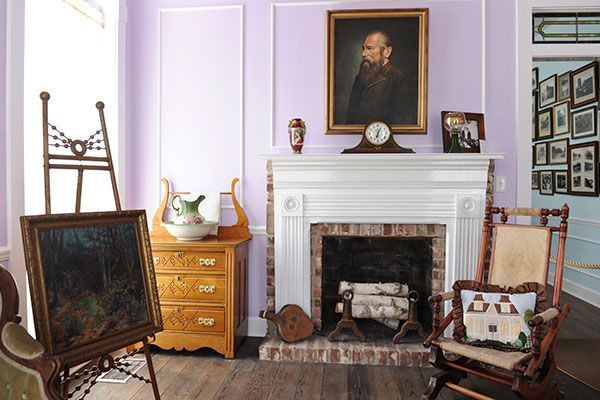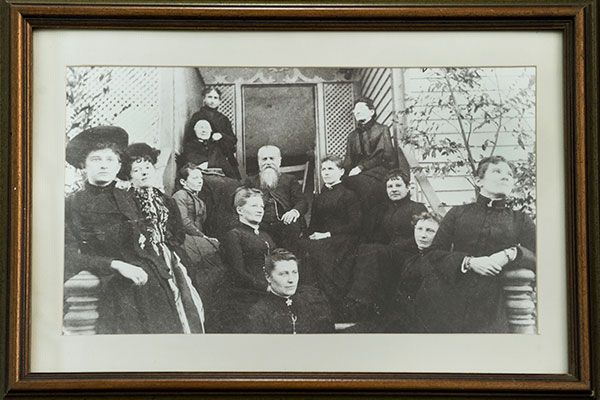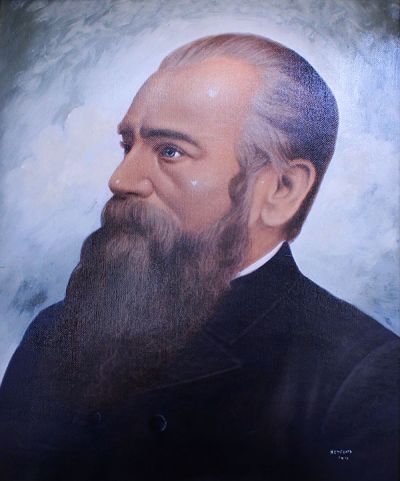John Cullmann, Founder: Die Deutsche Kolonie Von Nord Alabama
As the sounds from the Music Parlor float you along you will waltz into the Cullmann Room and view actual furniture from the original Cullmann house on First Avenue. John Cullmann lived over 27 years after founding the City of Cullman and in that time he brought thousands of Germans to the area to help fulfill his dream of establishing “Die Deutsche Kolonie Von Nord Alabama,” The German Colony of North Alabama.
However there were two Germans John Cullmann was unsuccessful in recruiting, his wife and daughter. When he died in 1895, all his worldly possessions were auctioned and the proceeds were sent to his wife, Josephine, in Germany. When the Museum opened, many of these items were donated to fill the Colonel’s room. There is an intricate bed made locally by the Dreher Furniture Company on which is displayed a beautiful hand crocheted bedspread made by John Cullmann’s great-niece, Mrs. Earney Bland. There is a classic bust of John Cullmann which was lovingly made by Father Timothy Harrison of Saint Bernard Abbey on display in this room. For those interested in the paranormal some staff members, both past and present, feel the Cullmann Room is haunted and it is possible that the Dreher bed is the one John Cullmann died in.
Photos of John Cullmann’s family and the ancestral Cullmann home in Frankweiler, Germany, are also on display. On the mantle is wine goblet with a picture of Cullman Mayor Jack Sides and Frankweiler Burgermeister Gunter Stiess, who drank from it at the twinning of the two cities in 1987, when Cullman, Alabama and Frankweiler, Germany became “Sister Cities” a relationship that last until today.



John Cullmann: A Man with a Mission
The following article was written by Stanley Johnson a long-time leader in the Cullman Community. A relative of our founder, his grandmother Julia Cullmann Hartung was a niece of John Cullmann. Mr. Johnson was my principle at the John G. Cullmann Middle School many years ago and though now deceased left many fond memories for not only myself but many other individuals and organizations who benefited from his generosity and love of Cullman. Mr. Johnson was involved in starting the Cullman County Historical Society which in turn was a catalyst for creating the Cullman County Museum and highlighting Cullman’s German connection. He was a driving force in the establishment of the local Friends of Frankweiler Club and supported our sister club in John Cullmann’s hometown, Friends of Cullman. He made many happy visits to his ancestor’s hometown in Germany and was often a gracious host when our German friends came to visit. The list of his services to his community would take many pages but needless to say his love of Cullman is reflected here in real and tangible ways each and every day.
Drew Green, Director
Cullman County Museum
Johann Gottfried Cullmann
There are many famous people from Alabama. But one settler to this state was overlooked until recently even though he was a remarkable man. He brought more immigrants to this country than any one individual and he founded a leading city and county in this state single-handedly. The adventures of this pioneer are very interesting. We hope to make this evident by what is said here.
The early life of Johann Gottfried Cullmann
John Cullmann (the Americanized version of the name) was born in Frankweiler, Canton Landau, the Rheinpfalz, Germany. At the time of his birth, Frankweiler was in the state of Bavaria. It is now in the Pfalz. He was born on July 2, 1823. His father was the geometer and teacher for Frankweiler. For over 200 years the family lived in a large home in the center of town, next to the church. His father was principal of the local school where Cullmann graduated at an early age.
This brilliant young man entered the Polytechnic Institute at Zweibrueken when he was 13. This necessitated his leaving home while still quite young. He studied civil engineering and obtained a degree similar to our junior college. He returned to Frankweiler, expecting to take the place of his father but left when he was not promised a raise from what his father had made. He had met Josephine Low at Zweibrueken and they were soon married and moved to Neustadt an der Haard, where he entered he export business and quickly became successful.
John and Josephine had four children: Theodore Gottlieb, Otto Gottfried, Maria (later Mrs. Ludwig Richard), and Alice, who died at age two. In Neustadt, John Cullmann became acquainted with many American businessmen who told him of their wonderful free country across the Atlantic, probably planting the idea for his later immigration and colony.
Revolution and flight
The revolution of 1848 developed in the Germanic states when John Cullmann was 25 years of age. He was an enlightened young man who felt his homeland was ready for democracy. The Hambach Castle of Neustadt was the center of this revolutionary activity, and John Cullmann seems to have been thoroughly involved in it. But, the monarchy in Bavaria was saved by the intervention of the Prussian army, thus giving John Cullmann ample reason to hate the Hohenzollern Princes of Prussia and their minister, Otto von Bismarck.
Cullmann lost a considerable fortune in this war but was able to overcome this. However, later in the Dano-Prussian War, he again lost his investments on the side of the losers. It now became obvious that all of Germany would soon fall under the oppressive rule of Prussia, and the freedom which John Cullmann coveted so much would be an impossibility.
John Cullmann made several attempts to re-establish himself in business, but he had become well known for his revolutionary activities, which had caused his bankruptcy. It became obvious that there was no future for him in his homeland and he had no desire to go to prison. By 1864, he had made definite plans to leave Germany. His wife came from a wealthy banking family in Zweibrueken, and she had no desire to leave Germany with her small children, so she returned to live with her family. John Cullmann thus left his family and first went to London, as his ultimate destination, the U.S., was embroiled in the Civil War. He knew that immigrants were often impressed into the army and he had no desire for further military activity in his life. But, he seems to have been formulating the idea of a free German colony in the U.S. where his friends, who loved freedom as he did, could come to live in peace.
Note: The article above was originally published by The Cullman Times in 1998 as part of a special issue commemorating Cullman’s 125th Anniversary. It is used here with The Times’ permission.